
 Xenophobia, austerity, and dissatisfaction with politics may have contributed to the Brexit vote. But James Dennison and Noah Carl write that, although a number of concerns may have tipped the balance, Brexit was ultimately decided by more than recent events. Here, they demonstrate how the UK has been the least well-integrated EU member state, and so the closer the EU was moving toward political union, the more likely Brexit was becoming.
Xenophobia, austerity, and dissatisfaction with politics may have contributed to the Brexit vote. But James Dennison and Noah Carl write that, although a number of concerns may have tipped the balance, Brexit was ultimately decided by more than recent events. Here, they demonstrate how the UK has been the least well-integrated EU member state, and so the closer the EU was moving toward political union, the more likely Brexit was becoming.
Since the British electorate voted to leave the European Union, many commentators have sought to explain (and often decry) the referendum’s outcome as the result of a misleading and demagogic Leave campaign, irrational xenophobia, simple racism, an obstinate protest vote, the government’s fiscal austerity policies, a largely Eurosceptic press, or general discontent about the economy. While several of these explanations have at least some merit, we believe they are insufficient. Indeed, they either put too much emphasis on recent events, or mistakenly assume that few Leave voters were motivated by dissatisfaction with Britain’s EU membership per se.
Regarding the former, a recent analysis of internet and phone polls suggests that Leave may actually have had the lead throughout the entire campaign, belying the claim that provocative statements made by Nigel Farage or Boris Johnson exerted decisive sway over prospective voters. Regarding the latter, evidence from the BES internet panel and Lord Ashcroft’s large post-referendum poll suggests that overall national sovereignty may have been just as important an issue for Leavers as immigration, and that austerity hardly registered.
Opposition to Britain’s membership of the EU has fluctuated over the years, but has remained substantial ever since the UK joined in the mid 1970s; somewhere between ~30 and ~60 per cent of the British public has always been opposed to EU membership. Of course, the Eurosceptic fraction of the population almost certainly increased as a consequence of the rapid rise in EU immigration, which began in the late 1990s, and the Eurozone debt crises, which precipitated mass unemployment across Southern Europe. Nevertheless, the most important phenomenon to be explained vis-à-vis the referendum result in our view is that a sizable Eurosceptic faction has remained extant in Britain over the last four decades, in contrast to the other countries of Europe.
In The American Voter, one of the seminal studies on voting behaviour, Angus Campbell arranged the myriad factors affecting vote choice within a so-called funnel of causality: ultimate causes – such as structural and historical factors – were placed on the left hand side of the diagram, while proximate causes – such as attitudes to individual policies and candidates – were placed on the right hand side. Similarly, and we show that in a number of important respects, the UK is the least well-integrated EU member state – essentially, the least European country – and that this fact likely stems from certain historical features, which arguably constitute the ultimate causes of Brexit.
Figure 1 shows national versus European identification for all 28 EU member states. The UK is ranked 28 out of 28 for European identity: nearly two-thirds of Britons do not identify as European at all, compared to fewer than 40 per cent of French and Italians, and fewer than 30 per cent of Spanish and Germans.
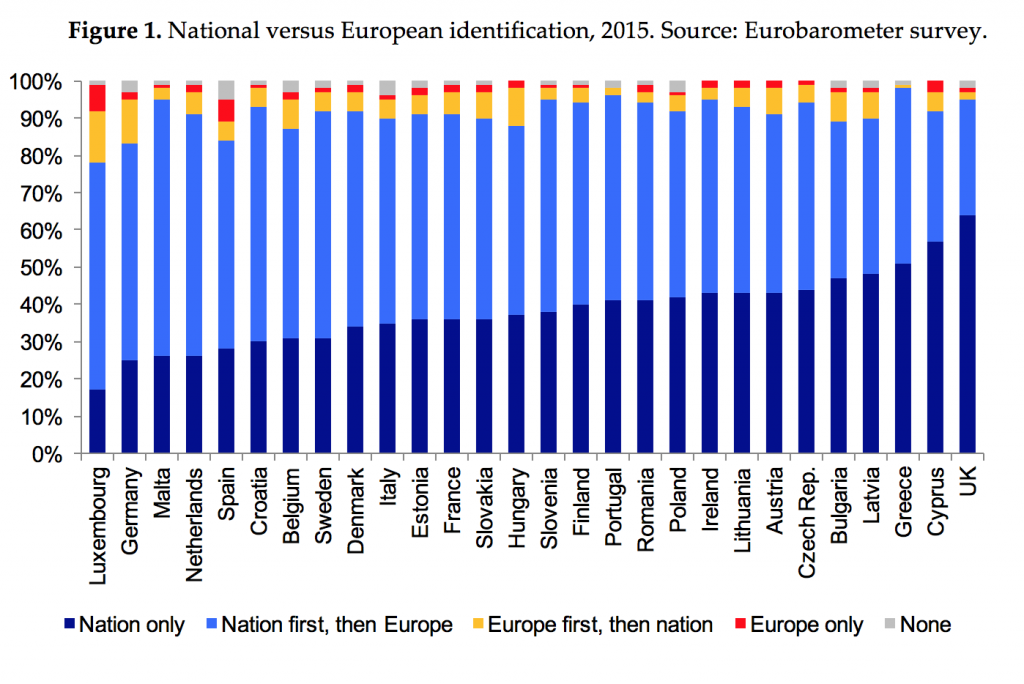 Figure 2 shows trust in the European Union for all 28 EU member states. The UK is ranked 26 out of 28: fewer than 30 per cent of Britons trust the EU, compared to 39 per cent of Germans, 47 per cent of Dutch and a full 57 per cent of Danes.
Figure 2 shows trust in the European Union for all 28 EU member states. The UK is ranked 26 out of 28: fewer than 30 per cent of Britons trust the EU, compared to 39 per cent of Germans, 47 per cent of Dutch and a full 57 per cent of Danes.
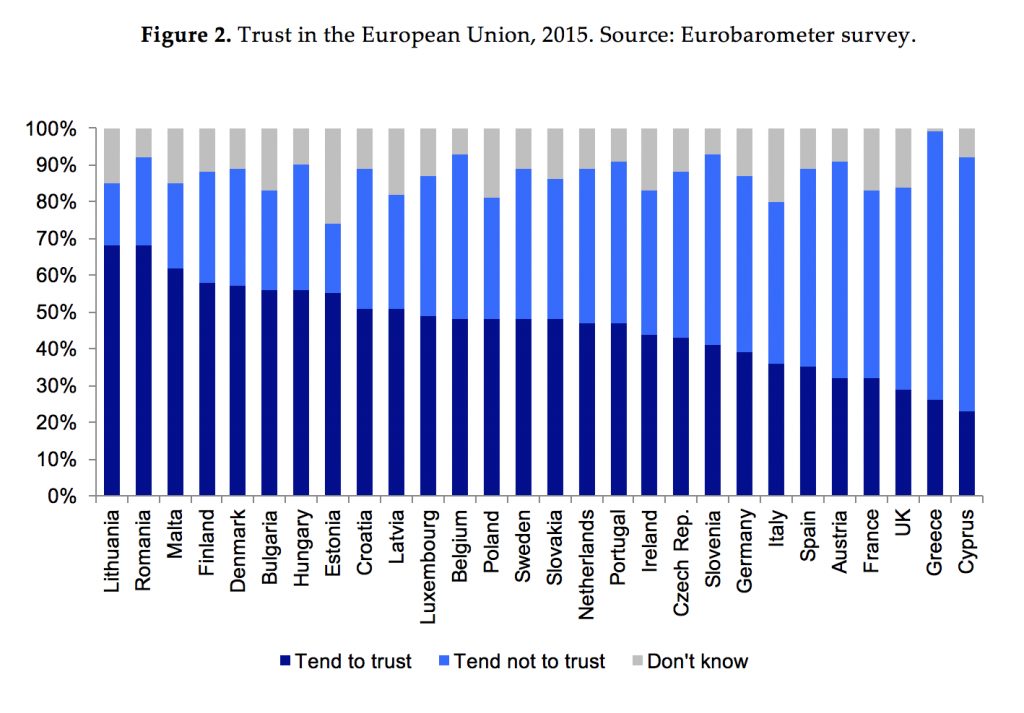 Figure 3 shows percentage of emigrants living inside the EU. The UK is ranked 28 out of 28, and by a non-trivial margin. Indeed, according to the latest UN data, there are more Britons living in Australia than there are in all 27 other EU countries combined.
Figure 3 shows percentage of emigrants living inside the EU. The UK is ranked 28 out of 28, and by a non-trivial margin. Indeed, according to the latest UN data, there are more Britons living in Australia than there are in all 27 other EU countries combined.
Figure 4 shows percentages of imports from the EU and exports to the EU. The UK is ranked 27 out of 28 for imports, and 28 out of 28 for exports.
Finally, Figure 5 shows percentages of Foreign Direct Investment (FDI) instock from the EU and FDI outstock to the EU. The UK is ranked 27 out of 28 on FDI instock, and is ranked 25 out of 28 on FDI outstock.
As the above charts illustrate, the UK’s comparatively limited integration into the EU is manifested in citizens’ self-identity, in their mistrust of the EU, in patterns of emigration, in international trade flows, and in foreign investment allocations. While the UK is not the lowest-ranked country on every single measure, it consistently ranks among the bottom two or three; the only countries that come close are Greece and Cyprus – both of which have suffered financial crises in recent years.
Britons’ comparatively less European self-identity and lower trust in the EU may have come about for the following reasons. First, Britain is the only allied European power not to have been occupied during the Second World War. Second, Britain has its own common law legal system, which contrasts with the civil law system of continental Europe. Third, because Britain has an established church, most British Christians have historically owed their allegiance to a national institution headed by the monarch, rather than to an international institution headed by the Pope. Fourth, Britain is an island whose surrounding waters have partially isolated it from cultural developments on the continent.
The fact that Britain’ does relatively more of its trade and investment outside of the EU, is due at least partly to the size and economic development of its former empire, the status of English as the global business language, and its particularly close ties with the United States.
All of these factors have served to stymie over-enthusiastically pro-EU business policy, exemplified most clearly in the previous Labour government’s decision to not join the Euro. In addition, Britain’s colonial past surely explains why relatively fewer of its emigrants choose to resettle in the EU. Indeed, several former British territories today have large British-descended populations
In conclusion, Britain is the least well-integrated EU member state: European, just not European enough. While short-term contingencies and concerns about other issues may have tipped the balance toward Leave, as the EU moved closer toward political union, the UK’s fundamentally less European character meant that Brexit was increasingly likely.
____
 James Dennison is a Researcher at the European University Institute in Florence. His work focuses on political participation. He is the author of The Greens in British Politics and tweets @JamesRDennison.
James Dennison is a Researcher at the European University Institute in Florence. His work focuses on political participation. He is the author of The Greens in British Politics and tweets @JamesRDennison.
 Noah Carl is a doctoral candidate in the Sociology department at the University of Oxford. His research focuses on the correlates of beliefs and attitudes and he is an editor and contributor at the demography blog OpenPop.
Noah Carl is a doctoral candidate in the Sociology department at the University of Oxford. His research focuses on the correlates of beliefs and attitudes and he is an editor and contributor at the demography blog OpenPop.


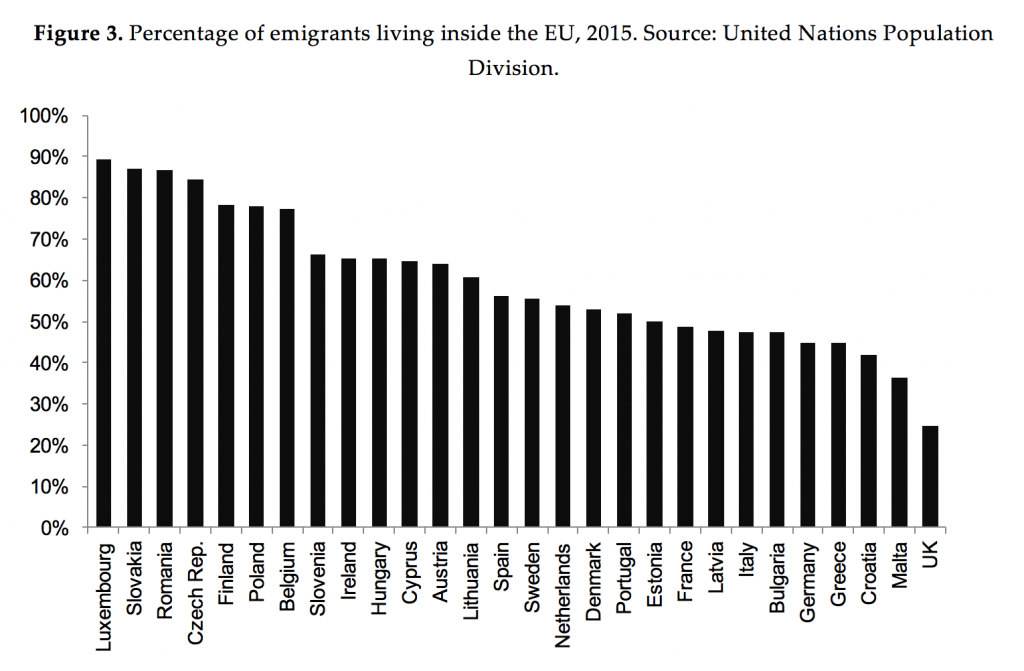
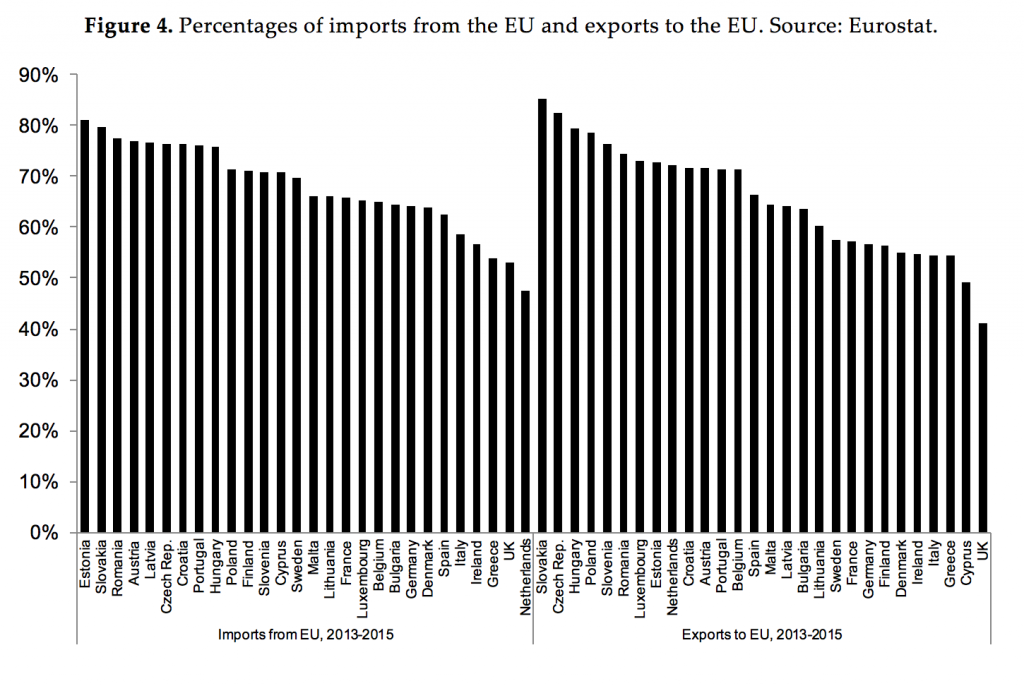
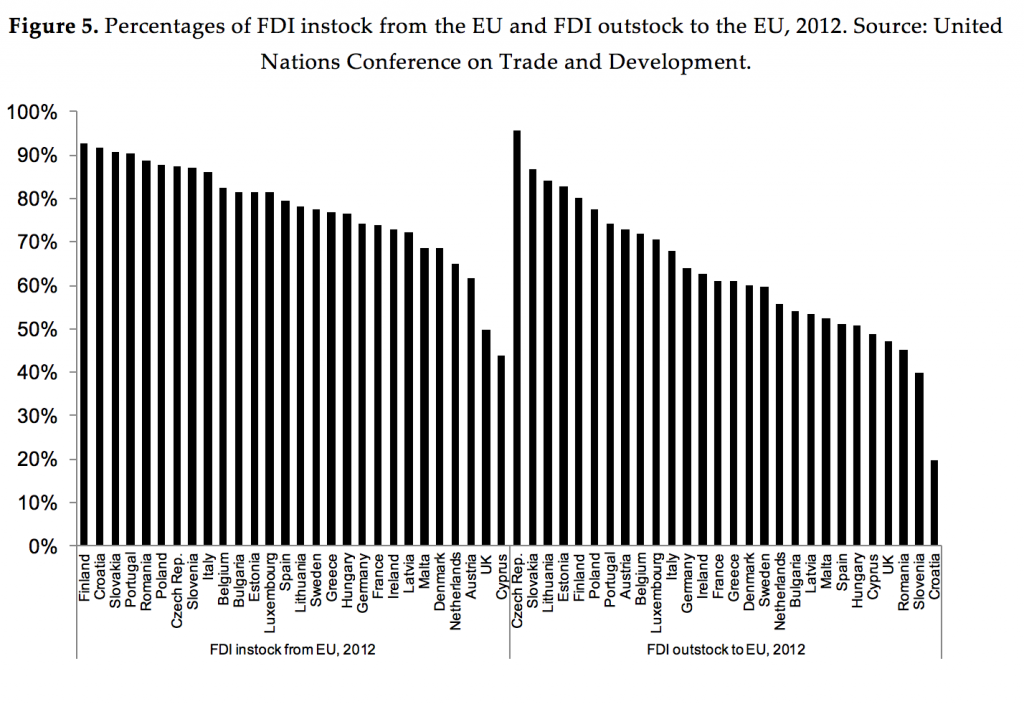



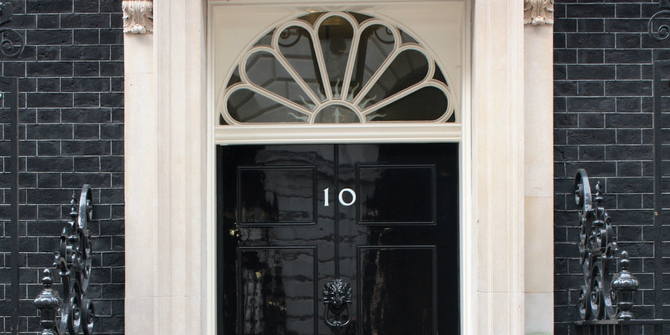


The working classes have never owed much allegiance to either the monarchy or the established church. However, they have imbibed a code of English/British exceptionalism which feeds into feeling less European than states on the mainland. Much more likely explanations of northern votes is that northern towns have unintegrated non-ethnic minorities many of whom are unemployed. The addition of nationals from eastern Europe, taking unskilled jobs in an area where any jobs are scarce has strengthened a feeling that the south and the government has abandoned the north – any money spent in the north is on things that neither bring jobs nor enhance an area – but the EU ‘paid’ for them, forcing these things on a populous that wanted proper infrastructure and some real jobs. Fish has also played a part!
Hi
Thanks for an interesting article and for the graphs. Interesting also that you posit euroscepticism as an English rather then a British phenomenon. This is worth further investigation. Consider that through the Barnett formula per capita expenditure is highest in NI followed by Wales, Scotland and lastly England, yet England has the highest population. Consider also that while the UK is a net contributor to EU funding, Scotland, Wales and Northern Ireland are net beneficiary.
On democracy, Scotland is separate, Wales and NI have their Parliament and Assembly, England has the main UK Parliament, which it doesn’t feel well-served by.Yes, I know there was a referendum to do the same for the North East, however it’s worth looking back to see what the proposition was, what the benefits were and how they attempted to sell them to the electorate, and what polling was done afterwards.
More recently, Mr Osborne’s devolution project promised Manchester and other cities who signed up net beneficiary status in terms of EU funding. This built resentment in those who noticed.
In the EU Referendum the Remain offer of a stable economy and staying on to effect change from within was unconvincing, given that we had been a Member State for 43 years and had been unable to effect change, and was in any event overshadowed in many people’s minds by the claims of doom and destruction should the UK leave the EU. Also, the main evidence in the North of EU membership benefits was a bunch of shiny vanity project buildings with a blue plaque on the door, plus a significant increase in immigration – there were no real positives. Such immigration was not evenly spread but localised to specific areas. Locals saw housing, educational, medical and other infrastructure strain under the load, but didn’t see any evidence of central government funding to Local Authorities to compensate.
London is so different from the rest of the UK (with the growing exception of Manchester) that perhaps it should be evaluated separately.
Finally and more generally, successive governments blamed the EU (sometimes wrongly) for an inability to take action. The media backed this up with a stream of stories of EU financial excess. The UK returned MEPs to the EU Parliament, however most people couldn’t name their MEP (I’m not sure what level of engagement MEPs had or have with the areas they represent.
HTH
Jim
The factors you cite probably explain nothing. After all Ireland has a common law legal system; it was not occupied during World War II; for the most part it is surrounded by water (it has a border with Northern Ireland). On that basis it should have been Eurosceptic but Europscepticism has only become prominent since the financial crisis. Although Ireland is very similar to Britain the European Union has been seen more favourably there than it has in Britian. Also, Euroscepticism seems to primarily an English, rather than a British phenomenon.
“Also, Euroscepticism seems to primarily an English, rather than a British phenomenon”.
Wales voted for Brexit.
Yes, but Ireland was getting massive EU funding until recently.
But Ireland is towards the upper end of Euroscepticism. It just doesn’t have the Sun, Mail and Express!
I expect people voted out for many different reasons. However, immense post 1997 annual NET immigration figures were a major factor.
I put the main reason for leaving down to the EU’s expansion into Eastern Europe and the too rapid granting of freedom of movement to the citizens of the latter prior to their economies catching up with the levels of socio-economic development of older member states. With little to no employment opportunities available for British workers in these countries while there were many for Eastern European workers in the UK, many citizens of Britain perceived a gross unfairness.
“Britain has its own common law legal system” No, England has this system, Scotland has a hybrid system closer to European ones.
Thanks for pointing that out. We should have been more careful with our language.